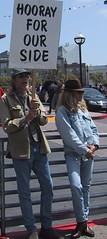What’s up with JPG Magazine?
So, I was checking up on my Flickr buddies when I saw Malavagma posted a screenshot, showing that she had deleted her JPG Magazine account. Why? Because the founders had been pushed out. Derek Powazek tells his account of how JPG came to be as an effort coordinated between he, his wife, and a guy named Paul. But as things evolved, the guy named Paul quietly managed to take things over, and recently, Paul decided to rewrite history. Derek’s post explains:
. . . once we looked at the spec for JPG 2.0, we realized that, if we built that tool, we could make a magazine on any topic. The opportunity we had before us was really “Magazine Publishing 2.0.”
. . .
Paul and I talked about all the different magazines we’d start, but ultimately decided to begin with JPG. The brand had two years of momentum behind it and a strong community. 8020 bought JPG from Heather and I for a modest sum.
. . .
We are no longer working for JPG Magazine or 8020 Publishing.
Why? The reasons are complicated, and the purpose of this post is not to air dirty laundry – it’s just to let the community know why the founders of JPG are no longer there. We owe you that much.
In one evening, Paul removed issues 1-6 from the JPG website, removed Heather from the About page, and deleted the “Letter from the Editors” that had lived on the site since day one. Paul informed me that we were inventing a new story about how JPG came to be that was all about 8020. He told me not to speak of that walk in Buena Vista, my wife, or anything that came before 8020.
Here’s where the whole “not lying” thing comes in. I just could not agree to this new story. It didn’t, and still doesn’t, make any business sense to me. Good publishing companies embrace their founding editors and community, not erase them. Besides, we’d published six issues with participation from thousands of people. There’s no good reason to be anything but proud of that.
We had a long meeting with Ron. I tried to compromise. I suggested we add text to the website, explaining the difference between issues 1-6 and the new issues. I wanted to embrace the truth: Tell people how we started, how we grew, and what we were now. It’s the story of how a successful, organic community begins. It’s the story of how authentic media gets made. And it has the added benefit of being true. Compromise could not be reached.
It became clear that we could not continue to work together with this fundamental disagreement. And because he was the CEO, I was the one who would have to leave. I still own a percentage of the company, so I hope to see JPG continue to grow and prosper. Unfortunately, it will be without its founding editors.
Note: Typos corrected and the emphasis is mine.
So . . . having recently subscribed to JPG Magazine, and having my own account, I had to consider . . . what do I do?
“Never attribute to malice what can be ascribed to [something else].” Or, perhaps, “measure twice, cut once.” I figured I’d take a stab at “fact checking” . . .
So, I took a look at JPG’s About Page to see the newly-revised history. Okay, no mention of “Publishing 2.0” or a walk in Buena Vista Park. Let us see what truth is being buried. I pulled up the old About Page from archive.org. Interestingly, no mention of Publishing 2.0 or a walk in Buena Vista Park either. A passionately proud ramble about the hard-working efforts of a fascinating husband and wife team who through pluck and hard work and determination brought a community together and started a visionary new collaborative magazine.
From what I can tell, the effort to re-write history amounts to a site re-design which moves from trumpeting the achievements of one married couple, to acknowledge the contributions of a larger team of staff.
And what of removing the first six issues from the site? True, the current Issues page lists only the past four issues. But, if you select a contemporary issue, then change the number in the URL, you’ll find that the first six issues are still on the web site. Removed? No . . . but not linked. If you look at the Issue 6 page, there’s a link to buy the issue from the previous publishing platform, lulu.com. Subsequent issues have a subscribe link instead. Why? I don’t know, but “lies about the true history” of the magazine does not feel like the most intuitive answer. In fact, if you scroll the 8020 Blog you’ll see Derek’s explanation of 8020’s origins.
So . . . . . . I don’t know what the story is. Maybe Paul Clautier is a greedy dick. Maybe he is a well-intentioned businessman who had difficult “creative differences” with the founding team. What I can see is that Derek Powazek feels very passionately about his pursuits, and feels that 8020 and JPG should “embrace their founding editors” but the way they agreed to set things up . . . . well, it sounds like Derek now has a great deal of flexibility to pursue his next ambition.
I fail to see any lying. Although I live in San Francisco, I fail to see why I should feel oppressed by The Man. I don’t see any point to deleting my account, beyond the fact that I don’t use it, much.
But if they don’t send me my damn “Ultra-pod” already, I may begin to feel differently.

